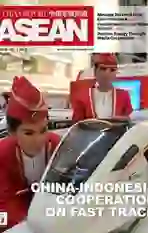TIGHT FOCUS ON EDUCATION COOPERATION
2018-05-14ByWangFang
By Wang Fang
Exclusive interview with Professor Dato Dr. Jayles Yeoh, Deputy Vice Chancellor of Asia Metropolitan University
Over the past few years, communication and cooperation between China and ASEAN in realms of economics, culture and education have increased impressively. As part of Chinas Belt and Road Initiative, education cooperation is starting to attract more attention from both sides.
Malaysia is an emerging destination for students looking to study abroad, and this year it was ranked one of the top ten preferred destinations for higher education through international schools. More and more Chinese students are choosing to study in the country. There is great potential for education cooperation between China and Malaysia.
What does the future hold for education cooperation between China and ASEAN? What are the current collaborations between Chinese and Malaysian universities? With these questions in mind, China Report ASEAN sat down with Professor Dato Dr. Jayles Yeoh, Deputy Vice Chancellor of Asia Metropolitan University, for an exclusive interview.
>>China Report ASEAN: What do you think about the development and changes in China since reform and opening-up?
Dr. Jayles Yeoh: My first visit to China was back in September 2001. I was then based in Changchun in the Northeast. Compared to then, China has seen huge development, not only in the fiscal infrastructure, but also with the people, especially in reform of thinking. The people of China have transformed in a profound way, which is moving the country forward.
If I compare the major changes I remember back on my first visit to China, few people were willing to speak English, and they acted humble about it although they could understand a little. But now people understand English a lot better, and they are enthusiastic about speaking English. Confidence and willingness to speak have increased tremendously, especially since the Beijing Olympics in 2008.
>>China Report ASEAN: What do you think about education cooperation between China and ASEAN?
Dr. Jayles Yeoh: If my memory is correct, many years back China did not consider ASEAN an important region for development. However, over the last five years, this has changed. Your new leader, President Xi, and other leaders in your country have taken actions that show the importance of the ASEAN market to China in terms of education cooperation.
ASEAN has a population of 700 million people, of which many, especially residents of Malaysia, Singapore, Thailand and Indonesia, speak English as a second language. I think China has made a massive leap in English education.
>>China Report ASEAN: What are your suggestions for education cooperation between China and Malaysia?
Dr. Jayles Yeoh: Malaysia has always been a very business friendly country to China. We have a population of over 30 million people compared to Chinas 1.3 billion. There is a lot of Chinese investment in Malaysia, particularly in property development and construction. Many Malaysians have developed businesses in China as well. The Belt and Road Initiative has received tremendous support from Malaysia, which has fueled immense cooperation in education development in terms of the Chinese accepting and recognizing Malaysia as a hub of international education.
Xiamen University of China has operated a satellite campus in Malaysia for many years. I estimate that Malaysia has graduated more than 30,000 Chinese students in total, counting both undergraduate and postgraduate students. This number testifies to the growing cooperation between Malaysia and China. From my point of view, China is an important country for Malaysian trade and business. Some 23 percent of the Malaysian population speaks Mandarin. We also have good Chinese schools, including primary schools and middle schools in addition to higher education. The widespread ability to communicate in Mandarin enables both countries to foster closer cooperation.
>>China Report ASEAN: What do you see as the advantages of Asia Metropolitan University in attracting students from the wider Asian market?
Dr. Jayles Yeoh: Asia Metropolitan University is private. We have produced many outstanding graduates in health sciences—nurses, physicians and pharmacists. Now we are moving into the field of business, management and new technologies. Our goal is to become one of the top business, management and IT institutions in Asia. Asia Metropolitan University offers both undergraduate and postgraduate degrees in acutely focused fields. All our programs are taught and delivered in English, and we are accredited by top international education bodies. Our graduates can pursue further studies in EU, U.K. and even the U.S.A. The concept of global student mobility should include educational experience in China.
>>China Report ASEAN: Asia Metropolitan University and many Chinese colleges and universities have already established cooperative relationships and jointly launched MBA programs. Could you please elaborate on specifics of the cooperation situation?
Dr. Jayles Yeoh: We are looking to work closely with Renmin University of China in Beijing, for example. Our Masters in Business Administration (MBA) programs can be taught in Renmin University in both Mandarin and English. Renmin University students will be thus exempted from four modules of our Asia Metropolitan University MBA. Instead of having to spend eighteen months, they can finish in twelve.
Asia Metropolitan University will be signing agreements with Beijing Geely University, Renmin University of China and Beijing Union University to kick start cooperation in global student mobilization between both countries particularly in fields of business, e-commerce and digital technologies. Students from ASEAN countries will come to China and complete some of their International MBA studies at Chinese universities. Future MBA graduates will be required to study in at least two different cities—for example Kuala Lumpur and Beijing. In China, international students will get the chance to learn new business philosophies such as the “shared economy concept” practiced by many Chinese businesses.
